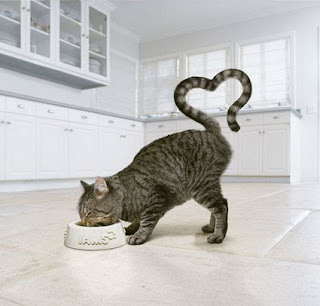The idea of preparing specialized food for cats came later than for dogs (see dog biscuits and dog food). This was very probably due to the idea that cats could readily fend for themselves. In 1837, a French writer critiqued this idea:
It is... thought wrongly that the cat, ill-fed, hunts better and takes more mice; this too is a grave error. The cat who is not given food is feeble and malingering; as soon as he has bitten into a mouse, he lies down to rest and sleep; while well fed, he is wide awake and satisfies his natural taste in chasing all that belongs to the rat family.
In 1844, another French writer expanded on this idea:
Normally in the country no care is taken of a cat's food, and he is left to live, it is said, from his hunting, but when he is hungry, he hunts the pantry's provisions far more than the mouse; because he does not pursue them and never watches them by need, but by instinct and attraction. And so, to neglect feeding a cat, is to render him at the same time useless and harmful, while with a few scraps regularly and properly given, the cat will never do any damage, and will render much service.
He goes on to say that it is all the more unreasonable to expect a cat to live from hunting in that cats take mice more for amusement than to eat: "A good cat takes many and eats few".
By 1876, Gordon Stables emphasized the need to give cats particular food:
If then, only for the sake of making (a cat) more valuable as a vermin-killer, she ought to have regular and sufficient food. A cat ought to be fed at least twice a day. Let her have a dish to herself, put down to her, and removed when the meal is finished. Experience is the best teacher as regards the quantity of a cat's food, and in quality let it be varied. Oatmeal porridge and milk, or white bread steeped in warm milk, to which a little sugar has been added, are both excellent breakfasts for puss; and for dinner she must have an allowance of flesh. Boiled lights are better for her than horse-meat, and occasionally let her have fish. Teach your cat to wait patiently till she is served—a spoiled cat is nearly as disagreeable as a spoiled child. If you want to have your cat nice and clean, treat her now and then to a square inch of fresh butter. It not only acts as a gentle laxative, but, the grease, combining in her mouth, with the alkalinity of her saliva, forms a kind of natural cat-soap, and you will see she will immediately commence washing herself, and become beautifully clean. (N.B.—If you wish to have a cat nicely done up for showing, touch her all over with a sponge dipped in fresh cream, when she licks herself the effect is wonderful.)
Remember that too much flesh-meat, especially liver,—which ought only to be given occasionally,—is very apt to induce a troublesome diarrhoea (looseness). Do not give your pet too many tit-bits at table; but whatever else you give her, never neglect to let her have her two regular meals.
In the same year, an ad for Spratt (better known for making dog food) said that their cat food entirely superseded "the unwholesome practice of feeding on boiled horse flesh; keeps the cat in perfect health." And in another book on cats Stables recommended the company's food:
Attend to the feeding, and, at a more than one-day show, cats ought to have water as well as milk. I think boiled lights, cut into small pieces, with a very small portion of bullock's liver and bread soaked, is the best food; but I have tried Spratt's Patent Cat Food with a great number of cats, both of my own and those of friends, and have nearly always found it agree; and at a cat show it would, I believe, be both handy and cleanly.
Spratt, which began by making dog biscuits, appears to also have been the first commercial producer of cat food.

Δεν υπάρχουν σχόλια:
Δημοσίευση σχολίου